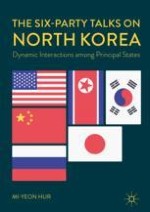2018 | OriginalPaper | Buchkapitel
3. Banco Delta Asia and DPRK’s First Nuclear Test
verfasst von : Mi-yeon Hur
Erschienen in: The Six-Party Talks on North Korea
Verlag: Springer Singapore
Aktivieren Sie unsere intelligente Suche, um passende Fachinhalte oder Patente zu finden.
Wählen Sie Textabschnitte aus um mit Künstlicher Intelligenz passenden Patente zu finden. powered by
Markieren Sie Textabschnitte, um KI-gestützt weitere passende Inhalte zu finden. powered by
